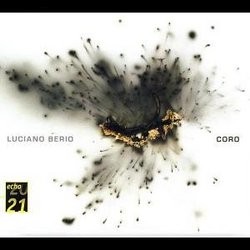| All Artists: Luciano Berio, Cologne Radio Symphony Orchestra Title: Luciano Berio: Coro Members Wishing: 0 Total Copies: 0 Label: Deutsche Grammophon Release Date: 11/12/2002 Album Type: Import Genre: Classical Style: Opera & Classical Vocal Number of Discs: 1 SwapaCD Credits: 1 UPC: 028947158721 |
Search - Luciano Berio, Cologne Radio Symphony Orchestra :: Luciano Berio: Coro
CD DetailsSimilar CDs
|
CD ReviewsProfound and Moving Christopher Forbes | Brooklyn,, NY | 02/16/2003 (5 out of 5 stars) "Berio is undoubtably one of the most brilliant composers of his generation in Europe. Schooled at Darmstadt in the high serialist manner and possessed of a wide ranging intellect and knowledge of culture, Berio never stayed comfortably in any one post-serialist niche. He is by turns a brilliant electronic composer, lyrical writer for the voice, and as experimental as anyone in the last 50 years. But even for all of his wide ranging interests (or perhaps because of them) I have always found him to be an uneven composer. At his best he is at least the rival and maybe the superior of Ligeti, but he does have his share of substandard and downright boring work. The present CD falls squarely in the brilliant category. Coro is written for choir and small orchestra. However the arrangement of the musicians is unique and extremely effective. Each of the 40 voices of the choir is paired with one of 40 instruments and spread throughout the playing area. As such, the mass of sound is much more complex than the small forces might lead you to expect. The sound is alternatively massive and transparent in almost a chamber sort of way. The texts set are engligh translations of tribal and folk poetry alternated with a poem by Pablo Neruda. Musically, Berio continues his exploration of folk music, begun in his marvelous Folk Songs cycles, but this time he weds the melos of folk music (with a few exceptions, he never actually quotes material, just procedures) with the complex collage techniques that he developed in the 60s with works like Laborynthus II and most brilliantly in the Sinfonia. The result is a dense, lyrical collage of cultures and musical styles, all kept integrated by Berio's phenomenal ear for sonority and Italianate sense of lyricism. The vocal writing is especially wonderful in this work. The piece begins with a solo for soprano and piano so intimate that I initially thought that something was wrong and I'd bought an art song recital rather than a choral and orchestra piece. Soon though the work gains in voices and then in instruments with strands of melody appearing and disappearing with amazing facility. The work has the same "river of culture" sort of feel that the third movement of the Sinfonia had, but with less obvious devices and a more folk-tribal feel. The performance on this disc is gorgeous. The disc is full and very present in the more chamber sections but gains beautifully in the loudest full orchestra sections. This range of dynamic is extremely difficult to pull off and actually eludes DG and Columbia in their renditions of the Sinfonia. And the singing is terrific. This piece is one of Berio's masterpieces I believe. I like it even better than the Sinfonia (which, though brilliant, I think begins to sound dated now.). In many ways, Coro can be thought of as a bridge between the very literal way in which Berio treats folk songs in the vocal cycle and the brilliant treatments he gives Sicilean music in his marvelous Voci. But the work is a tou de force on it's own. If Berio had written nothing but this, he would be a significant composer indeed. Treat yourself to this piece." A powerful political statement for chorus & orchestra R. Hutchinson | a world ruled by fossil fuels and fossil minds | 02/24/2003 (5 out of 5 stars) "Berio characterized CORO as a "plan for an imaginary city." He also called it "a substantially epic and and narrative structure made up mostly of self-contained and often contrasting episodes." As the title indicates, CORO is a powerful vocal work, but in addition to the 40 voices of the Cologne Radio Chorus, it also utilizes the Cologne Radio Symphony Orchestra, and each singer is paired with an instrument throughout. This modern masterpiece resembles works by Nono and Xenakis, as a point of reference, and not only in the music but in the content as well.
Berio has not been known for his political engagement, in contrast to Nono, but CORO centers on a fragment of Neruda's poetry, the line: "Venid a ver la sangre por las calles," or "Come and see the blood in the streets." The import is less clear than in Nono's explicitly revolutionary work, but why choose Neruda, a man of the left, if not to make a point? The work was written from 1975 to 1977, shortly after Pinochet's bloody U.S.-backed coup in Chile, and first recorded in 1980. This is that recording, with Berio himself conducting, reissued in DG's 20/21 Echo series (there is at least one other recording, on Col Legno. Berio weaves folk narratives throughout the piece, punctuated by the line from Neruda, from his Residencia en la Tierra (1933-47). He utilizes texts from the Sioux and Navajo, Peru, Polynesia, Gabon, Venice and Sicily, Hebrew, and others. While sung in German, the excellent booklet, with notes by both Berio and Paul Griffiths, includes all the lyrics in English. As Griffiths points out, "These folk utterances...are expressed in short pregnant phrases and speak of a oneness between man and nature, of a life ordered by ritual, of love and death accepted without qualm or confusion." For anyone with ears open to the sounds of modern music, CORO is not to be missed. Along with Nono's COMO UNA OLA DE FUERZA Y LUZ, for Soprano, Piano, Orchestra & Magnetic Tape (1971-72), it is a masterpiece of the 20th century." |


